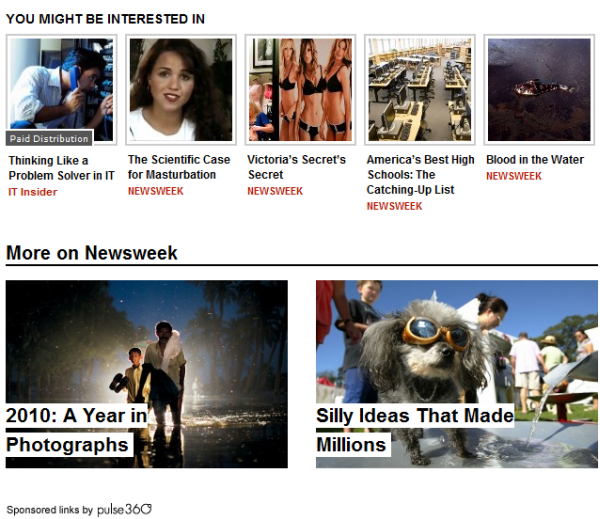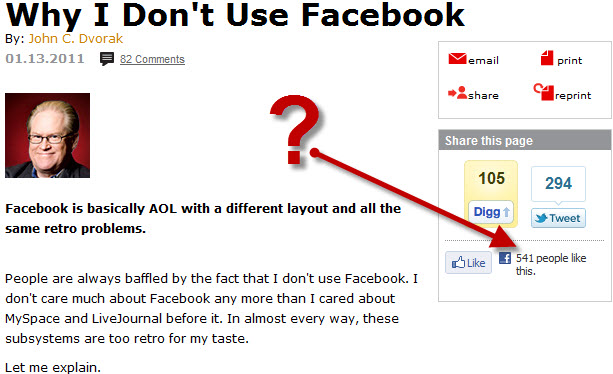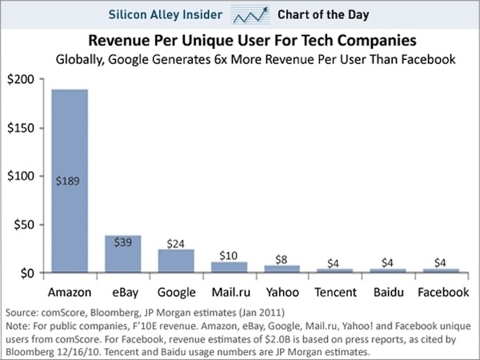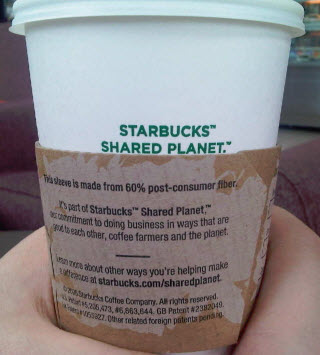How Social Media Changes Everything*
Bloggers as Media
Have you ever noticed that a lot of blogs want to be seen as being the same as the media? And media companies are responding by hiring bloggers. But why is emulating the media so exciting? After all, the same media is so big, bloated & redundant that it is buried in debt. How is it possible that a humor blog network built on open source software would ever need to raise $30 million?
The problem is that it is hard to stay different and operate at scale. You eventually become that you claimed to hate. If you are good at public relations you can claim to be different to build exposure, but ultimately once a site becomes large there is no incentive for creating signal. Rather the game becomes generating as much exposure as you can to sell to brand advertisers. Content can be dressed up to stand out, but at the core it is basically the same.
Bloggers can state that the hype cycle they hype shouldn't be hyped, but action speaks louder than words. We can say we don't need more Scoble hype (and the associated retractions), but rather a more filtered one. The problem is there is no incentive on the publisher front. Check out how outraged TechCrunch comment freetards were at the idea of a $4 per month premium offering from Kevin Rose.
If people don't want to pay for quality instead they pay for it by having to wade through more junk, scams & repetition.
Here are 2 posts from TechCrunch about Yahoo!. Both published on the same day. Both saying the same thing. There isn't much difference between them than what a good markov generator could do.
And, of course, there are the obligatory cat fights. Junk.
A Comfortable Spin
What's worse is that many sites exist simply to sell you a pre-existing worldview rather than a pragmatic view of the world:
The million channel words brings addressability. There is no mass any more. You can't reach everyone. Mad Men is a hit and yet it has only been seen by 2% of the people in the USA.
The mcw bring silos, angry tribes and insularity. Fox News makes a fortune by pitting people against one another. Talkingpointsmemo is custom tailored for people who are sure that the other side is wrong. You can spend your entire day consuming media and never encounter a thought you don't agree with, don't like or don't want to see.
The polarization from such media & the blow-by-blow content style leads people to worry about inconsequential crap like their political ideology, where they can write based on a checklist. It makes them notice the trivial differences while remaining blinds to important things, like the systemic fraud that is supported and encouraged by both leading political parties. Arguing inconsequential details becomes increasingly addictive because the blame has to be sent to "them" rather than where is squarely belongs.
Media as a Conduit For Scams & Misinformation
Do you find it perplexing that the same media (which claims to be legitimate) has no problems running ads for total scams? Isn't it bizarre that the same media that claims to protect citizens from the evils of the marketplace tries to blend the ads for such scams in with their navigation to sell their readers down the river? Is this what you would expect of Newsweek?

Is that anything to aspire to?
Jokingly Geordie suggested how annoying he found the gallery sections on media sites with videos and pictures that seem like they are fresh off the Jerry Springer show. "WATCH: Teen beats ferret to death and eats it!" In the short run online advertising can grow quickly through tricking people, but the end result is distrust & people become less receptive.
That same media leaves the real media work to the comedians:
The problem is lack of sufficiently broad exposure to the facts here in the US. We don’t have a fourth estate, a national media in the role of providing checks and balances to government and business excesses. Instead we have media that sells product. In the late 1990s it sold tech stocks, in the early 2000s the Iraq War, from 2002 until 2007 it sold houses, and in the future it will sell whatever measures are a “necessary” price for social stability, national security, or whatever phrases are used, because things are going to get dicey once this 40 year old Rube Goldberg monetary and trade contraption comes apart when it’s hit with a Peak Cheap Oil sledgehammer in the middle of the Jon Stewart show. I mean, how healthy is the American fourth estate when all of the serious journalism here is done by comedians?
Governments often do dangerous and illegal things - which is why they fear each other. When the truth gets exposed people go to jail. Unfortunately, it is the wrong people who go to jail.
Social Media is Different*
Isn't it weird that the mark of a successful blog is that it starts to look and feel and act like bloated media organizations? Is social media any better? Or is social media mostly a bunch of lemmings following each other off the side of the mountain?

Just because there is lots of information doesn't make all of it valuable. In fact, some of it has negative value. Who are the people who login to Facebook so they can vote on Facebook about how Facebook is a waste of time & they don't use it?
As one social network crumbles the hype cycle is peaking out for the next.
Hyping a Social Network
The whole wave of online communication and publishing is that a new service promotes itself as disrupting x by making y more efficient. Most of it is simply a repeat of the recent past. Bookmarks were popular. Then they were not. Then bookmarks were popular. Now they are not. Soon they will be again. :)
The narrative of "change" gives new companies a niche or angle to get press coverage from. People ask if it is the next Google, or more! The service then go under-monetized for a couple years to feed growth and scale. The whole time the site is not monetized stories are seeded in the media about how media format x is powerful for brands even if the lead examples are nonsense.
Cashing Out
But ultimately what happens is the networks turn their navigational options into ad units and try to confuse users. Monetization is the name of the game as insiders rush to cash out.

Facebook turns user messages into ad units via sponsored stories, doing something akin to turning beacon back on without anyone caring. Even as Facebook's CEO page gets hacked, they want you to trust them with sharing as much information as possible (even if there is no benefit to you) and turning your messages into an ad unit.
If the NFL puts you in one of their commercials (without paying you or offering you free tickets) then they are simply using you as free content to sell more ads against. It is not like they are putting you in the revenue stream.
What Privacy?
How is it possible that we are told that data has value but privacy allegedly does not? Most such stores of data are built through an invasion of privacy.
Privacy has value. What happens when your account gets hacked & you start recommending some uncomfortable stuff? What happens when a stalker catches you on the way home based on one of your messages? How many such experiences will be viewed as a series of isolated events before people figure it out? Once these ads lose their novelty will there still be real businesses behind them? Or is narcissistic advertising the wave of the future even as people realize they are being spied on?
LinkedIn, the professional version of Facebook, is pushing hard on ads as well. And when they buy tools they can sell as services they often prefer to give those away to make the site more sticky and sell more ads.
Is Twitter any better? In some regards sure, but they are building a self-serve ad network and are pushing followers and retweets as ad units. Wherever there is conversation there will be advertisers. New ad units will claim to move beyond the click, but ultimately they will be measured by the people selling the ads. This ends up being a game of fakemytraffic.com/fakemyvalue.com...where networks find something that sounds appealing at first blush and then water it down.
Finding a Social Signal Amongst Sponsored Stories
These companies blend their ad units into editorial so effectively that most people can't tell them apart. If that sounds familiar, that is because it is. The key to making it work is perceived relevancy. That is easy to do when you have a large ad auction and users type their intent into a search box, but is much harder to do when people are browsing pictures of cats.
Anyone who thinks that social is a clean search signal is forgetting that people vote most for stuff that his humorous & easy to share. And people share things that they saw others shared because they felt they had to. The echo chamber effect doesn't encourage critical thought. It is mostly a bunch of +1.
The following video is sad & funny. It has been viewed widely, but it does nothing to fix a broken education system.
And there are entire categories that will never be featured honestly on social media. Sure the idea of turning Kinect into a virtual sex video game will get lots of exposure, but is anyone ever going to honestly Tweet about their favorite solutions to their genital warts problem? Is there enough context to matter? Worse yet, all these networks are turning their relevancy signals into ad units, so if a search engine was to count them heavily all the search engine would be doing is subsidizing the third party ad network. And the scammers who are pushing reverse billing fraud products on the news sites will do as much damage as they can get away with on the social sites.
Google's Amit Singhal is skeptical of the hype:
If there's a broad call at the company to integrate social networking features, Singhal hasn't quite heard it. He seems skeptical about whether social data can make search results significantly more relevant. If he's searching for a new kind of dishwasher, he argues, his friend's recommendations are interesting, but the cumulative opinion of experts manifested in search results is much more valuable. He notes that Google already integrates content from Twitter and says social networking data is easily manipulated. Can social context make search more relevant? "Maybe, maybe not. Social is just one signal. It's a tiny signal," he says.
If Google can't find much signal there then good luck to the folks trying to use Tweets to trade the (increasingly corrupted) stock market!
Why People Like Social Media
I think social media gives people the illusion of success through proximity. Thus people are impressed to rub shoulders with successful people, even if they are douchebags and liars to boot. There is the unsaid message that “you too can be a billionaire” that a lot of entrepreneurs and start up folks want to believe in that drives the growth of Quora. But the reality is that celebrities are whoring out their status for a quick payday, even if the advertiser value in such relationships is marginal.

Someone wants to eat my dog. Other than breathing, writing English(ish), and having a Twitter account, I probably do not have anything in common with that person. And yet there is no tool to sort that out.
That is the big problem with most social media tools: the monolithic nature.
And if you look at what brands (and even smaller advertisers) are doing, it is pretty clear that the "signal" in social isn't much of a signal. If they count that, then search engines may as well just use ad budget as the primary signal of relevancy at that point.

Why Smaller Communities Will Thrive
I am not sure where I read this quote from, but I think it went something like this "we are most similar where we are most vulgar and most unique in the ways we are sophisticated." That is precisely why a lot of the broader networks will repeatedly fail in efforts to build strong niches outside their core. It is why there is so much value in being a fast follower.
Given the interrupting noise and angst on social networks people (or at least the smart ones who are well experienced in the game of life & spend time to think deeply) eventually outgrow most of their social media habits.
Ultimately Social Media Changes Nothing
Human nature is both predictable & easily exploited. How you frame a question informs how people respond. We live in a corporate world where certain lies are expected & diseases are branded for maximum profitability.
Messaging and imagery allow piss poor product to be branded as food. The abuse of language is so thorough that even the words "shared planet" need a TM next to them.

What is Driving the "Social Revolution"?
A week ago Andy Xie wrote:
The inflation and bubbles in the developing world are not yet destabilizing because the dollar is weak and the hot money supports their currency values. Historically, inflation becomes a crisis in the developing world when the dollar turns around and appreciates. However, it is possible for inflation to create a crisis without a currency crisis. It erodes the purchasing power of the people at the bottom. Social unrest can lead to political crisis
That destabilization is now happening. What was an isolated incident in Tunisia has spread to Egypt. The same criminals that destroyed the United States economy are now blowing up other countries with rampant inflation:
The currency pegs mean that most of the inflationary pressure you're creating doesn't hit your nation, it's exported to others. That exactly how you like it, because you can claim "inflation expectations are well-anchored." Perhaps they are in your nation, but in other places they're extremely unanchored and are not only expectations, they're realized facts as the basic cost of life spirals up out of control.
This, in turn, provokes food riots in these less-well-endowed nations that you managed to dupe into participating in your outrageous scheme. After all, there's only one thing worse than a hungry man. That's a man who used to be well-fed and now he's both hungry and ****ed, along with being unemployed.
When his belly growls loudly enough, he riots. And so do his similarly-situated neighbors.
The social revolution we are seeing now is not due to social media. When Egypt shuts off the web (literally) Twitter and Facebook don't really matter. What you are seeing is not the power of online social networks, but rather smart marketers who are trying to embed their networks in media coverage of important events. You don't get mobs in the street the size of the following when the internet is unplugged if Twitter is the cause.

Rather such mobs are caused because the lack of media doing its job to enforce a sense of outrage over the injustices caused upon societies the world over by banking criminals. If there was any sense of justice the large banks that caused this mess would have been bankrupted. But instead we base economic strategy on the theoretical economy rather than its impact on the real world.
People are just an externality for bankers to exploit.
Meanwhile, those who let bankers commit fraud the world over think Twitter makes a difference. At least it's comical.





Comments
"not really" :)
but I couldn't really work it into the post without it sounding weird & the post was likely already too long as it was. ;)
First-it'll take me two days to look at all those links. My employer thanks you. ;)
But this smacked hard of some of the things Lanier hit on in "You Are Not a Gadget" - like the idea that this path is our only one (not), and the damaging collective power of small, anonymous and unsubstantiated bits of information over time.
I think the key is that at the bottom of it all is choice from a discerning audience. But creating this discerning audience is becoming nearly impossible, when small bits of insulated anonymity seem to work just fine - and like the banner says, just click the "Like" button and save $5. This pack mentality nicely complements that falling attention span also hinted at here, and year-after-year, true engagement suffers.
FUD-spinning is a national past-time here in the US. And like you and Lanier both point out, it is essentially the exact wrong way to use the Internet...because rather than opening you up to new ideas, the direction its taking allows you to insulate yourself from balance. Surround yourself with sycophants and congratulate each other.
I like to think it is not too late to adjust, and prevent total social deterioration - which brings us back to the idea that this is not our only choice...but it seems to be the direction. If small, anonymous shouts into the ether become our only recognized collective action online, and perception can be adjusted by paying someone to pretend to "Like" it, we're doomed.
This article is pure gold, and making me miss the forums even more.
Social media has an extremely high noise factor. I think people will look back on this era, or at least hopefully they will, and see how empty their lives were. I think you are correct in your comment of proximity. If someone has 2,000 friends on FB, then certainly I need to be their friend because they must be important.
Sure I have connected with people there from my past that I might not have otherwise. I don't think there are any of them that I'm having ongoing, meaningful conversation with though. Its just shallow stuff. We need to spend a little less time on the computer and more time in the real world.
Writing this must have felt like a really good workout at the gym. And while this post is really 4 or 5 in one, I think I get the idea. I don't feel that the internet has really changed as far as how people and companies use it, I think they've just decided to do what they do in public these days. I'm not sure that either of them realize exactly what they're doing, and that represents a pretty a scary trend that's caused a big shift in culture as a whole, some for good, some for worse. Your privacy comments are right on, and to me that's the most disturbing. People are ready and willing to post to public timelines, not really worried about the consequences. The tools we have these days are designed to faciliate communication, the same as always, but instead of being the equivilent of stepping into an empty office to have a private chat these new tools have us standing on the street corner shouting for all to hear. As a marketing medium the social internet is made up of small brands using the same old tired incentive tactics, sponsored content and scams and big brands spending tons of money on defensive campaigns to minimize the public bashing of their brand via openly public forums disguised as empowering tools to empower the masses. In a way it's a trap for brands; give the people a new channel to vent and brands are forced to participate and console, again, this could be for better or worse. The tool or network wasn't designed to be a marketing medium (that would mean having a monetization plan) but it becomes one since people online, believing they're anonymous, are going to use it as an opportunity to complain, or advocate, depending on what's in it for them. We're at the point that we assume someone is out the representing a brand as an active listener, ready to help. Once the brands have been forced to play ball, tools like Facebook and Twitter try to come up with a way to make a buck off them. Their best idea so far is injecting ads into the stream. My guess is that's not going to end well.
The web is full of junk, most search results are biased, Google sucks and so does FB and Twitter. Nothing is going to change that, the human nature is (apparently) seeking the lowest common denominator and most people are shallow... there is no way of fixing the human nature so the web sucks. just like most people suck. trying to capitalize on that is just another human trait
Were you working on this for a couple of days? Great insights as usual - the noise is getting louder
I saved links over a while (maybe a few weeks or so) and then I spent a couple hours writing one day and a couple hours the next, trying to fit the links where they belong in the story, move bits around, and then put headings where they belong.
That was intense and one point! You must feel 10 pounds lighter after cranking that out...
I used to have a whole spiel in response to the social sycophants who would prance around proclaiming that, " 'social' is the next 'search'!
You've just provided the perfect pin to prick that bubble.
And the myopic myth about social media fomenting revolution...if only. The sad, sad truth is that social media has severely diluted what our parents called 'social activism'. If Moveon.org is the model for activism in the digital age, then the corrupt and elite have very little to worry about.
Awesome post...I'll see what I can about Bill Maher.
Here is a NYT article about how the social revolution happened in Egypt. Note that the protests were not highly driven themselves directly by social media, but rather that by having online places that provided free hosting of videos and such it was essentially able to archive content so it could be seen over and over by people - so that many people could become aware of it over time...in effect fanning the flames until something happened.
Ultimately that sounds to me that is more akin to SEO (and perhaps a slight bit of word of mouth marketing) than it is straight up "social media."
My Youtube videos have collectively had well north of a million video views. Do I consider that "social" media? Not really. I consider that as video SEO which benefited from being pushed on multiple channels (our site here, on our Youtube account, etc.)
A lot of folks who manipulated Digg for profit would get around such blocks by creating a thin content piece on a trusted media site & submit that, seeing that piece go viral. So the same content was remarkable and viral promotion-worthy content if it was on a user generated content section of a trusted website, but if you submitted the same content to Digg and tied it to a non-media site it would often be considered as spam.
And even without top down central editors / bury brigade stuff, it turns out that Twitter is the same way, in terms of its most popular and far spread stories coming from the mainstream media, according to researchers at Hewlett-Packard. HP research shows mainstream media drive Twitter ‘trends’ to a surprising degree:
I think people believe that social media allows them to subvert hierarchy, but we tend to stick to mental shorthands and cues for what to trust. If something is "in the media" there is less perceived risk in thinking it is important and remarkable. Whereas coming up with a new story and/or betting on a person who few others have vouched for requires greater thought and greater risk. Humans are naturally driven by efficiency and laziness. And 140 characters doesn't quite give people much space to pontificate on issues. The required concision prevents people from expressing elaborate & unconventional thoughts.
From ScienceNews:
Add new comment